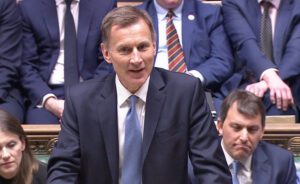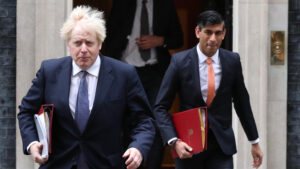UK investigates using frozen Russian assets to fund Ukraine defence

<?xml encoding=”utf-8″ ?????????>
The government has asked the Bank of England to look at options for using Russian sovereign assets to fund Ukraine’s war effort, Chancellor Jeremy Hunt has told media.
Mr Hunt said finance ministers around the world had discussed what more they could do, beyond sanctions, to disrupt Russia’s ability to pay for the war.
“This is an illegal war,” Mr Hunt said.
“We need to do everything we can to make sure that Russia cannot continue to fund it.”
Speaking at the IMF’s annual conference in Marrakech, Mr Hunt told the BBC that finance ministers from some of the world’s largest economies – the G7 – had discussed “whether Russian sovereign assets could be used to fund Ukraine’s defence”.
“Anything to make sure that Putin knows in the end he won’t be able to afford this kind of aggression,” he said.
On Thursday, the G7 said it would explore how to tax profits on seized Russian assets to support Ukraine “in compliance with applicable laws”.
In September, US Treasury Secretary Janet Yellen and Mr Hunt signalled support for a European Union plan for a windfall tax on profits generated by frozen Russian assets.
Earlier in the year, the US had looked at using the assets themselves to help pay for Ukraine’s defence, but decided that it would not be legal to do so.
Mr Hunt said on Friday: “Britain will always act within international law, but the G7 have asked central banks to look at what might be possible because we are absolutely clear this is an illegal war, this war is against international law.”
The chancellor said that the war in Ukraine was proving more “protracted” than people had hoped, and that the world needed to guard against what he called “Ukraine fatigue”.
He added: “We do have to be honest with people that this is going to take some time, and that’s why in the meantime we need to be very prudent and cautious with the way we manage the British economy.”
The European Union and the US have been exploring ways to use frozen assets and make sanctions against Russia more effective.
On Thursday, the US government took action against two companies who had breached a price cap on Russian oil.
A number of countries including the US, the G7, the European Union and Australia created a coalition to cap Russia’s crude at $60 a barrel to “constrain Russia’s ability to prosecute its war against Ukraine”.
The US found that a vessel owned by Turkey’s Ice Pearl Navigation Corp and a tanker owned by Lumber Marine of the United Arab Emirates exported crude at $80 and $75 a barrel respectively.
The US Treasury has blocked the US property and interests of the companies.
The tightening of sanctions sent oil prices higher on Friday.
Brent crude, the international benchmark for oil prices, rose by 3.6% to $89.68 a barrel. West Texas Intermediate also rose by 3.6% to $86.58.
Soaring energy prices have pushed up average gas and electricity bills for UK households, and the cost of fuel has added to a squeeze on the cost of living.
Mr Hunt said that gas prices “are four times what they were before Ukraine, and oil prices are nearly 40% higher, and the single biggest cause of instability is Putin’s aggression in Ukraine”.




